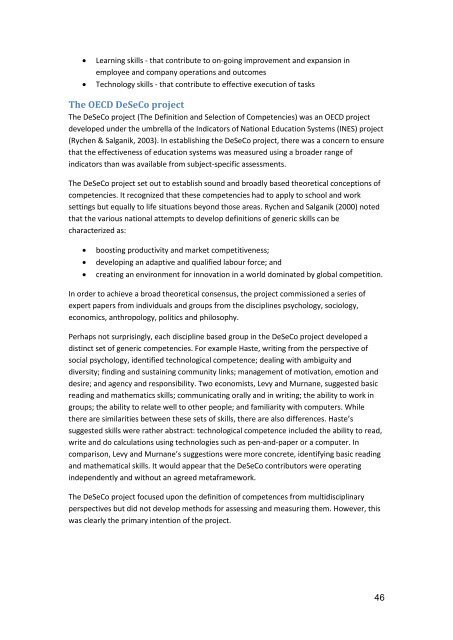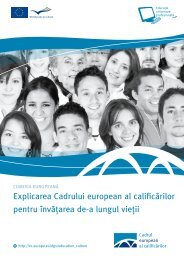Teaching and Assessing Soft Skills - MASS - Measuring and ...
Teaching and Assessing Soft Skills - MASS - Measuring and ...
Teaching and Assessing Soft Skills - MASS - Measuring and ...
Create successful ePaper yourself
Turn your PDF publications into a flip-book with our unique Google optimized e-Paper software.
Learning skills - that contribute to on-going improvement <strong>and</strong> expansion in<br />
employee <strong>and</strong> company operations <strong>and</strong> outcomes<br />
Technology skills - that contribute to effective execution of tasks<br />
The OECD DeSeCo project<br />
The DeSeCo project (The Definition <strong>and</strong> Selection of Competencies) was an OECD project<br />
developed under the umbrella of the Indicators of National Education Systems (INES) project<br />
(Rychen & Salganik, 2003). In establishing the DeSeCo project, there was a concern to ensure<br />
that the effectiveness of education systems was measured using a broader range of<br />
indicators than was available from subject-specific assessments.<br />
The DeSeCo project set out to establish sound <strong>and</strong> broadly based theoretical conceptions of<br />
competencies. It recognized that these competencies had to apply to school <strong>and</strong> work<br />
settings but equally to life situations beyond those areas. Rychen <strong>and</strong> Salganik (2000) noted<br />
that the various national attempts to develop definitions of generic skills can be<br />
characterized as:<br />
boosting productivity <strong>and</strong> market competitiveness;<br />
developing an adaptive <strong>and</strong> qualified labour force; <strong>and</strong><br />
creating an environment for innovation in a world dominated by global competition.<br />
In order to achieve a broad theoretical consensus, the project commissioned a series of<br />
expert papers from individuals <strong>and</strong> groups from the disciplines psychology, sociology,<br />
economics, anthropology, politics <strong>and</strong> philosophy.<br />
Perhaps not surprisingly, each discipline based group in the DeSeCo project developed a<br />
distinct set of generic competencies. For example Haste, writing from the perspective of<br />
social psychology, identified technological competence; dealing with ambiguity <strong>and</strong><br />
diversity; finding <strong>and</strong> sustaining community links; management of motivation, emotion <strong>and</strong><br />
desire; <strong>and</strong> agency <strong>and</strong> responsibility. Two economists, Levy <strong>and</strong> Murnane, suggested basic<br />
reading <strong>and</strong> mathematics skills; communicating orally <strong>and</strong> in writing; the ability to work in<br />
groups; the ability to relate well to other people; <strong>and</strong> familiarity with computers. While<br />
there are similarities between these sets of skills, there are also differences. Haste’s<br />
suggested skills were rather abstract: technological competence included the ability to read,<br />
write <strong>and</strong> do calculations using technologies such as pen-<strong>and</strong>-paper or a computer. In<br />
comparison, Levy <strong>and</strong> Murnane’s suggestions were more concrete, identifying basic reading<br />
<strong>and</strong> mathematical skills. It would appear that the DeSeCo contributors were operating<br />
independently <strong>and</strong> without an agreed metaframework.<br />
The DeSeCo project focused upon the definition of competences from multidisciplinary<br />
perspectives but did not develop methods for assessing <strong>and</strong> measuring them. However, this<br />
was clearly the primary intention of the project.<br />
46





